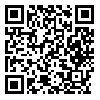شمارۀ جدید فصلنامه (زمستان 1403) منتشر شد
Volume 13, Issue 1 (9-2022)
Social Problems of Iran 2022, 13(1): 181-208 |
Back to browse issues page
Download citation:
BibTeX | RIS | EndNote | Medlars | ProCite | Reference Manager | RefWorks
Send citation to:



BibTeX | RIS | EndNote | Medlars | ProCite | Reference Manager | RefWorks
Send citation to:
Kazemipour A, Goodarzi M. (2022). The ups and downs of trust in Iran during the last half century:
A look at trends, causes, and consequences. Social Problems of Iran. 13(1), 181-208.
URL: http://jspi.khu.ac.ir/article-1-3520-en.html
URL: http://jspi.khu.ac.ir/article-1-3520-en.html
1- Professor of Sociology, University of Calgary, Canada
2- PhD in Sociology and Social Researcher ,mgoodarzi@gmail.com
2- PhD in Sociology and Social Researcher ,
Abstract: (1949 Views)
The existing data for the past few decades indicate that the Iranian society is struggling with a widespread crisis of trust. The global distribution of trust based on WVS data shows Iran among the low-trust countries (with 15% of population trusting others), while other societies such as Scandinavian countries, the Netherlands, and China have reported trust levels above 60%, others such as Australia, Canada, Switzerland, South Africa, and Vietnam are between 40 and 60%, and scores of less than 10% have been reported for low-trusting countries such as some African countries and the new states formed out of the former Yugoslavia that have either experienced a civil war, genocide, or are run by drug cartels. In this article, we have studied the changes in the level of trust in three areas – general trust, political trust, and institutional trust. The empirical data show a decline in all these three areas. What adds to the seriousness of this declining trust is the close association between trust and other indicators of societal well-being. We have discussed the implications of this situation by placing the empirical findings in two conceptual frameworks. In one framework -- in which the society is understood as a triangle of state, market, and community – the decline of trust is taken as a sign of the decline of community and, consequently, the rise of the power of state and market. This is reflected at both institutional and individual levels, as evident in the rise of ‘governmental-public-sector’ and ‘selfish individualism’. In the second framework, the findings are situated in a 2X2 matrix of high/low social/political trust. Of the four possible combinations in this matrix, the situation in Iran seems to be corresponding with a low/low combination on both dimensions, the most likely outcomes of which are crisis and chaos/disintegration. Altogether, the data indicate that Iran is facing a deep, serious, and worrisome crisis of trust -- a situation that requires a thorough and well-thought response based on a scientifically robust, precise, and empirical account of the current situation. This article is a step in that direction.
Type of Article: Original Research |
Received: 2022/06/23 | Accepted: 2022/09/14 | Published: 2022/09/18
Received: 2022/06/23 | Accepted: 2022/09/14 | Published: 2022/09/18
References
1. اسدی، علی (۱۳۵۴(. نگرشهای اجتماعی و گرایشهای فرهنگی، تهران: پژوهشکده علوم ارتباطی.
2. اوفه، کلاوس (۱۳۸۵). چگونه میتوان به شهروندان اعتماد داشت. در رابرت پاتنام و دیگران، سرمایۀ اجتماعی: اعتماد، دموکراسی و توسعه، به اهتمام کیان تاجبخش، مترجمان افشین خاکباز و حسن پویان: 275-201. تهران: شیرازه.
3. غفاری، غلامرضا (۱۳۸۶). سنجش و تبیین سرمایۀ اجتماعی در ایران، تهران: معاونت اجتماعی وزارت کشور.
4. غفاری، غلامرضا) ۱۳۹۴). سنجش سرمایۀ اجتماعی. تهران: دفتر طرحهای ملی وزارت فرهنگ و ارشاد اسلامی و مرکز ملی رصد اجتماعی وزارت کشور.
5. کاظمیپور، عبدالمحمد؛ و گودرزی، محسن (۱۴۰۰). افول اجتماع در ایران: روایتی گاهشمارانه (کرونولوژیک). رفاه اجتماعی. جلد ۲۲، شمارۀ ۸۴ (بهار ۱۴۰۱): ۲۶۹-۳۰۰.
6. کورزمن، چارلز (۱۴۰۰). ناگهان انقلاب، ترجمه رامین کریمیان. تهران: نی.
7. گودرزی، محسن (۱۳۸۲). پیمایش ارزشها و نگرشهای ایرانیان موج دوم. تهران: دفتر طرحهای ملی وزارت فرهنگ و ارشاد اسلامی.
8. گودرزی، محسن (1383). پیمایش تحولات فرهنگی ایرانیان. تهران: دفتر طرحهای ملی وزارت فرهنگ و ارشاد اسلامی.
9. گیدنز، آنتونی (1377). پیامدهای مدرنیت. ترجمه محسن ثلاثی، تهران: مرکز.
10. مسکوب، شاهرخ (۱۳۷۹). روزها در راه، جلد دوم. پاریس: خاوران.
11. محمود، احمد (۱۳۸۳). زمين سوخته. چاپ هفتم، تهران: معين.
12. موسوی، میرطاهر) ۱۳۸۶). بررسی و سنجش سرمایۀ اجتماعی در ایران. تهران: دانشگاه علوم بهزیستی و توانبخشی و سازمان مدیریت و برنامهریزی.
13. Etzioni, Amitai (2001a). "On Social and Moral Revival. " The Journal of Political Philosophy 9 (3): 356-371. [DOI:10.1111/1467-9760.00132]
14. Etzioni, Amitai (2001b). "Review: Is Bowling Together Sociologically Lite?" Contemporary Sociology 30 (3): 223-224. [DOI:10.2307/3089233]
15. Etzioni, Amitai (2015). The New Normal: Finding a Balance between Individual Rights and the Common Good. Londong and New York: Routledge
16. Polanyi, Karl (1957). The Great Transformation: The Political and Economic Origins of Our Time. Boston: Beacon Press by arrangement with Rinehart & Company, Inc.
17. Putnam, Robert D. (2000). Bowling alone: the collapse and revival of American community. New York: Simon & Schuster [DOI:10.1145/358916.361990]
18. Sztompka, Piotr (2006). Trust. In B. S. Turner (Ed.), The Cambridge dictionary of sociology (pp. 639-642). New York: Cambridge University Press.
Send email to the article author
| Rights and permissions | |
 |
This work is licensed under a Creative Commons Attribution-NonCommercial 4.0 International License. |






